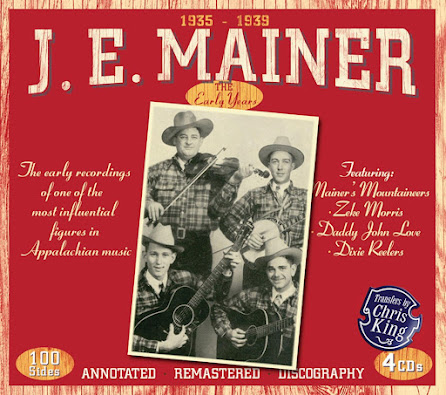J. E. Mainer (July 20, 1898 – June 12, 1971) was an American old time fiddler who followed in the wake of Gid Tanner and his Skillet Lickers.
Joseph Emmett Mainer grew up on a farm in the mountains near Weaverville, North Carolina, United States, and learned to play the banjo and fiddle from an early age. Since Wade, his brother, also was interested in learning to play the banjo, he left that to Wade and concentrated on the fiddle. Soon, Mainer began performing at local country barn dances. He found work at a textile mill in Knoxville, Tennessee, but moved to Concord, North Carolina in 1922 for another work in a mill.
Mainer's fame as a fiddler rose and sponsored by the Crazy Water Crystals in 1933, he and his newly formed band consisting of J. E. on fiddle, Wade Mainer on banjo, and Zeke Morris on guitar, made their radio debut on WBT in Charlotte, North Carolina, calling themselves J.E. Mainer and his Crazy Mountaineers. The band appeared on several radio stations in the following years until 1935, when they received a recording contract. One of the 14 songs recorded at that session was "Maple on the Hill," a turn-of-the-century sentimental standard originally composed by the African-American Cincinnati janitor-composer Gussie Davis. The song had been introduced to country audiences by both Vernon Dalhart and the Carter Family, but the mournful warmth of J.E.'s fiddle and Wade's banjo made it a country standard.
In August the same year, the Mountaineers, with the addition of "Daddy" John Love, recorded for Bluebird Records. Wade Mainer and Zeke Morris temporarily left the band in the early 1936 to form a duo. In the meantime, Ollie Bunn, Howard Bumgardner and Clarence Todd replaced Wade, Zeke and "Daddy" John Love on the next recording session.
In the summer of 1936, Wade and Zeke returned to record with "the mountaineers". The next year, in 1937, Wade Mainer formed the "Sons of the Mountaineers". Shortly, a new change of personnel occurred when Leonard "Lester" Stokes and George Morris became members of "the mountaineers" calling themselves "Handsome and Sambo". They added Snuffy Jenkins on banjo on the following recording session. In late 1938, Stokes and Morris were once more replaced by Clyde Moody and Jay Hugh Hall. The band continued to perform on radio stations in both North and South Carolina. The Mountaineers disbanded at the outbreak of World War II, but Mainer continued to record in the late 1940s, together with his sons, Glenn and Curly, for King Records.
Following WWII, J. E. confined most of his playing to the Carolinas, Tennessee and Virginia. He recorded in 1946, with a band whose most prominent members were his sons J. E."Curly", Jr. and Glenn, who developed into a quality Bluegrass banjo picker. J. E. Mainer’s Mountaineers had four recording sessions in 1946 that resulted in several singles and two albums. An enduring original from these sessions was "Run Mountain”.
In 1962, Chris Strachwitz of the Arhoolie label visited J. E. in Concord and subsequently cut a new album, “The Legendary Family from the Blue Ridge Mountains”. This led to the re-discovery of Mainer’s Mountaineers by a new generation of fans across the U.S. and in the summer of 1963 they appeared at the Berkeley Folk Music Festival, , which introduced Mainer's music to a whole new generation. King reissued some of the Mountaineers recordings (such as Good Ole Mountain Music) in the early '60s, and over the course of that decade Mainer recorded several more albums and made appearances on the radio and at festivals.
Beginning in 1967, J. E. cut a series of 20 albums for Uncle Jim O’Neal’s Rural Rhythm label, guested on the WWVA Jamboree and played numerous festivals while continuing to live modestly in his country home in Concord. He continued to perform until his death in June 12, 1971.
Mainer was inducted into the North Carolina Music Hall of Fame on October 11, 2012.
(Edited from Wikipedia. AllMusic & Blue Ridge Music Hall of Fame)







